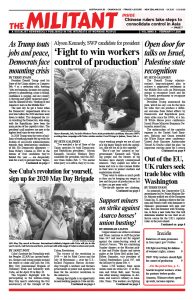The Donald Trump administration’s long-anticipated plan to achieve a negotiated settlement in the Middle East calls on Palestinian groups to recognize Israel and for the Israeli government to recognize a Palestinian state.
President Trump announced the plan, which he says can be the basis for talks that can produce a different outcome from failed efforts by Democratic and Republican presidents alike since the 1990s, at a Jan. 28 White House press conference. Israeli Prime Minister Benjamin Netanyahu joined him.
The ambassadors of the capitalist regimes in the United Arab Emirates, Bahrain and Oman attended the White House news conference. United Arab Emirates Ambassador Yousef Al Otaiba called the plan “an important starting point for a return to negotiations.”
The governments of Egypt, Saudi Arabia and Qatar also welcomed the U.S. administration’s initiative. The Qatari government — which gives hundreds of millions of dollars to both Hamas in the Gaza Strip and the Palestinian Authority in the West Bank — released a statement saying it appreciates “all efforts aiming towards a longstanding and just peace in the occupied Palestinian territories.”
This is a change from the not-so-distant past when most Arab governments gave aid and political support tied to the refusal by the leaderships of the Palestinian Authority and Hamas to recognize Israel’s right to exist as a Jewish state.
The mostly Sunni-led regimes in the region have increasingly relied on U.S. military support and improved ties to the Israeli government to counter Tehran’s aggressive efforts to extend its reach.
But Palestinian Authority President Mahmoud Abbas responded by saying, “I reject this plan outright” at a special meeting of the Arab League Feb. 1. He said he refused to even read the 181-page document, adding, “Trump asked that I speak to him over the phone, so I said ‘no.’”
The League, including delegates from Saudi Arabia and others who had expressed backing for new talks based on the Trump administration’s proposals, voted unanimously to back Abbas.
Jared Kushner, the main architect of the plan and Trump’s son-in-law, has pushed to make it clear that everything is open to negotiations. “If the Palestinians don’t like where the line is drawn,” he said in an interview with Egyptian MBC Masr news network, “they should come and tell us where they want to draw it.”
And the administration has pressed the Israeli government not to take any new steps in the occupied territories.
The fact is working people in the West Bank and Gaza have been losing confidence in the Palestinian Authority and Hamas leaderships, tired of their dead-end course. Hamas has repressed demonstrations and locked up opponents as discontent with its rule has grown, even as it has cut deals with the Israeli government to allow thousands of Gazans to work inside Israel.
Every time the Palestinian misleaders refuse to pursue opportunities to discuss a settlement, it means they start from a worse position. “The record of Arab-Israeli peace efforts can be summed up succinctly,” New York Times columnist and former Jerusalem Post Editor-in-Chief Bret Stephens said in his Jan. 30 Times column. “Nearly every time the Arab side said no, it wound up with less.”
Well-known Saudi journalist Abdulraham al-Rashed wrote in Asharq Al-Awsat, “The greatest danger to Palestinian interests now is to do nothing and continue waiting for a miracle.”
All of these factors mean the Trump administration plan has a better chance of making headway than any other proposal in decades.
The proposal’s ‘starting point’
Under the Trump administration proposal about 70% of the West Bank would be under Palestinian rule, and some 30%, centered around the Israeli settlements there, would be ceded to Israel.
An “undivided Jerusalem” under Israeli control would become the capital of Israel. The plan proposes that Palestine’s capital would be in neighborhoods to the east of what is traditionally East Jerusalem, outside the current “security” barrier.
The deal promises a four-year freeze on new Israeli settlements. In exchange for land ceded to Israel, it extends the West Bank farther south and would give the Palestinian state two additional areas, near Gaza and Egypt.
The Trump administration proposal also calls for disarming Hamas and Islamic Jihad in the Gaza Strip, linking Gaza and the West Bank for the first time through an underground high-speed rail line, and offers $50 billion in economic “assistance.”
The Trump administration is also pressing the Israeli government to hold off any new moves to allow the greatest chance for the opening of negotiations. When Netanyahu attempted to use the proposed deal to push through legislation recognizing Israeli law over the settlements in the West Bank, Kushner warned him off.
Negotiations a ‘political necessity’
When the Trump administration, backed by Democratic Senate Minority Leader Charles Schumer, officially recognized Jerusalem as the capital of Israel in December 2017, the Socialist Workers Party said this showed the “political necessity for the Israeli and Arab governments and leaderships of Palestinian organizations to begin immediate talks to recognize both Israel and an independent Palestinian state.”
Trump’s new proposal calls for the same response.
The SWP statement notes that negotiations “must recognize the right of Jews everywhere to take refuge in Israel in face of the global rise of Jew-hatred and anti-Semitic violence, as well as the unconditional right of the dispossessed Palestinian people to a contiguous, sovereign homeland on territory — including East Jerusalem — conquered and occupied by the Israeli government during the 1967 war.”
An agreement along those lines would advance the ability of working people “of all national backgrounds, religious beliefs and political allegiances in Israel and Palestine,” it said, “to speak, organize and begin redressing the blood-drenched legacy of imperialist domination and capitalist exploitation” in the region.
In the face of decades of defeats and setbacks for working people in the Middle East, caused by anti-working-class misleaderships, whether Stalinist, bourgeois nationalist or Islamist, the SWP says, the toilers need a different starting point: “the class interests and solidarity of workers and toiling farmers across the Middle East — be they Palestinian, Jewish, Arab, Kurdish, Turkish, Persian or otherwise, and whatever their religious or other beliefs — as well as working people in the United States and around the world.
“We are for whatever helps working people organize and act together to advance our demands and struggles against the capitalist governments and ruling classes that exploit and oppress us.
“We are for whatever renews our class solidarity and self-confidence, advancing us along a revolutionary course toward a united struggle for workers power.”

